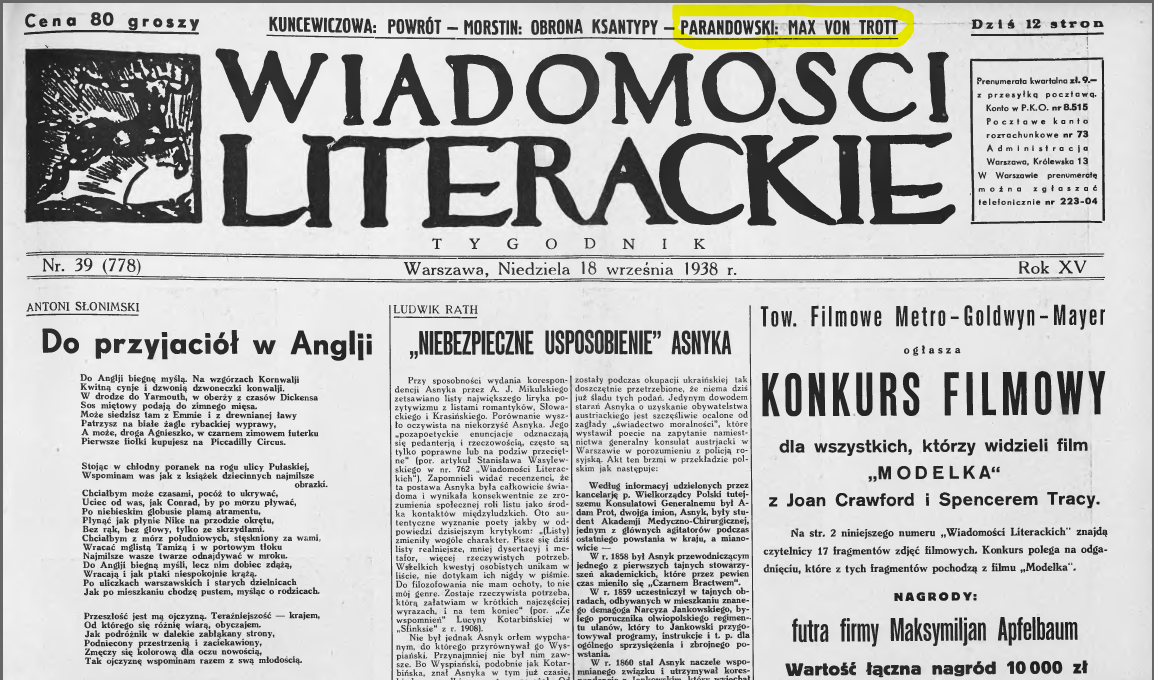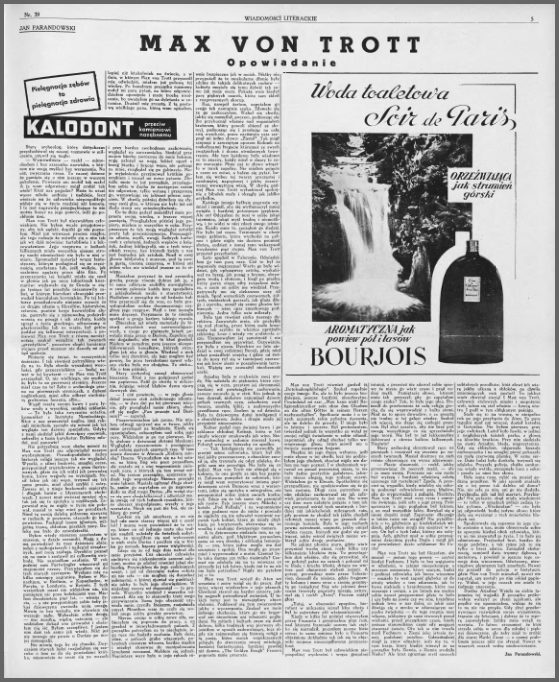Title of the work
Country of the First Edition
Country/countries of popularity
Original Language
First Edition Date
First Edition Details
Jan Parandowski, Godzina śródziemnomorska. Warszawa: Gebethner i Wolff, 1949, 238 pp.
ISBN
Genre
Essays
Target Audience
Crossover
Cover
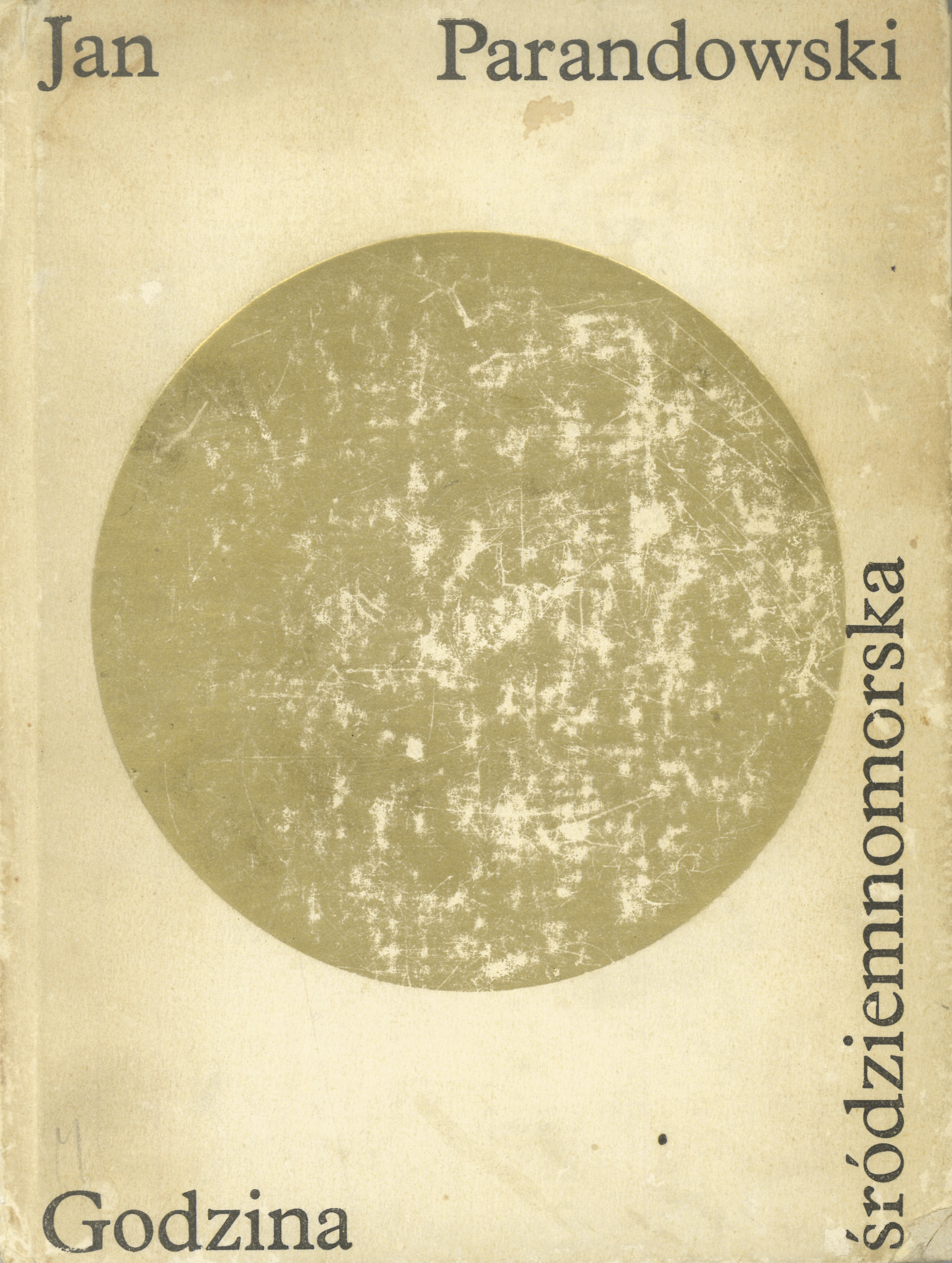
Cover from the edition Warsaw: Państwowy Instytut Wydawniczy, 1970. Illustrated by Tadeusz Kulisiewicz.
Author of the Entry:
Summary: Agata Więcławska, University of Warsaw, a.wieclawska@student.uw.edu.pl
Analysis: Marta Pszczolińska, University of Warsaw, m.pszczolinska@al.uw.edu.pl
Peer-reviewer of the Entry:
Katarzyna Marciniak, University of Warsaw, kamar@al.uw.edu.pl
Elżbieta Olechowska, University of Warsaw, elzbieta.olechowska@gmail.com
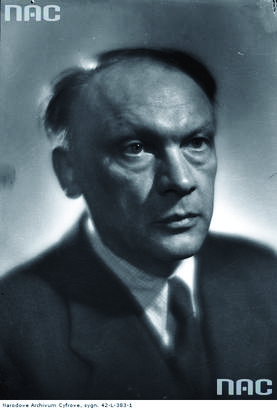
Photograph by Edward Hartwig, retrieved from the National Digital Archives.
Jan Parandowski
, 1895 - 1978
(Author)
Classical philologist and archaeologist. An outstanding and prolific author of books related to Antiquity; translator of classical masterpieces. Contributed to many Polish newspapers and magazines. Chairman of the Polish PEN Club from 1933 to 1978. Recipient of prizes for outstanding literary achievements, such as a bronze medal received at the 1936 Berlin Summer Olympics for his book Dysk olimpijski [Olympic Discus]. Member of the European Society of Culture. In 1962 he was elected Vice-President of the International PEN. An exceptionally successful supporter and advocate of Classical Antiquity in Poland. His Mitologia. Wierzenia i podania Greków i Rzymian [Mythology. Beliefs and Legends of the Greeks and Romans], still often read even in primary school, remains for many generations of Polish readers a fundamental source of the knowledge of ancient myths.
Major works: Eros na Olimpie [Eros on the Olympus], 1924, Mitologia. Wierzenia i podania Greków i Rzymian [Mythology. Beliefs and Legends of the Greeks and Romans], 1924; Wojna trojańska [Trojan War], 1927; Oscar Wilde’s biography Król życia [A King of Life], 1930; Dysk olimpijski [Olympic Discus], 1933; Niebo w płomieniach [Heaven in Flames], 1936; Trzy znaki zodiaku [Three Signs of the Zodiac], 1938; Godzina śródziemnomorska [The Mediterranean Hour], 1949; a study on creative writing Alchemia słowa [Alchemy of the Word], 1951. He also translated into Polish Caesar’s Civil War, 1951, and Homer’s Odyssey, 1953.
Sources:
Krełowska, Danuta, Jan Parandowski: życie i twórczość, Toruń: Wojewódzka Biblioteka Publiczna i Książnica Miejska im. M. Kopernika, 1989.
Paciorkowska, Monika, Jan Parandowski, slideshare.net (accessed: December 30, 2020).
"Parandowski Jan", in Jadwiga Czachowska and Alicja Szałagan, eds., Współcześni polscy pisarze i badacze literatury. Słownik biobibliograficzny, vol. 6: N–P, Warszawa: Wydawnictwa Szkolne i Pedagogiczne, 1999, 254–260.
"Parandowski, Jan", in Encyklopedia PWN, encyklopedia.pwn.pl (accessed: December 30, 2020).
wikipedia.org (accessed: December 30, 2020).
Życiorys Jana Parandowskiego, kul.pl (accessed: December 30, 2020).
Bio prepared by Joanna Grzeszczuk, University of Warsaw, joannagrzeszczuk1@gmail.com
Translation
German: Mittelmeerstunde, Berlin: Rütten & Loening, 1960.
Summary
Based on: Katarzyna Marciniak, Elżbieta Olechowska, Joanna Kłos, Michał Kucharski (eds.), Polish Literature for Children & Young Adults Inspired by Classical Antiquity: A Catalogue, Faculty of “Artes Liberales”, Warsaw: University of Warsaw, 2013, 444 pp.
A collection of thirteen texts* containing personal memories and author’s reflections on the Mediterranean world, particularly on the legacy of Ancient Greece and Rome. The selection presents famous scholars studying ancient culture, as well as poetic descriptions of the Mediterranean landscapes. There are also some dialogues, with well-known figures from the ancient world of politics and literature, e.g., Cicero and Caesar.
* N.B. The 1st ed. published in 1949 by Goebethner & Wolff did not contain Odysseus’ Last Journey. The 1956 ed. published by Polski Instytut Wydawniczy (PIW) is composed of twelve essays discussed in the Analysis. The 1970 ed. published also by PIW contains also another essay, Lascaux.
Analysis
The author published a collection of short texts* written in different years, mostly during WW2. Having selected his pieces, Parandowski highlighted a common, overarching tone to them, which he called “a Mediterranean Hour”. The title represents the name of an inn, where unknown travelers from different places came together. The author writes that in the darkest days of the war, classical antiquity helped him to survive. He worked on a translation of Caesar’s De bello civili which was a private re-conquest of “his” Rome and Italy. He also reached for Cicero’s letters which he had not read since the Great War, and for Horace. This contact with ancient masters provided salvation to the author by immersing him into a world which cannot be destroyed, wrecked or re-shaped by any external force. Even though his work on Caesar’s translation was lost, burnt down along with home and the whole city, it was not in vain because the author emerged strengthened by the feeling of being part of Antiquity.
The legacy of the ancient Greek and Roman world is present through memories, dialogues, short scenes and stories. Artifacts, minor historical anniversaries, ancient writers or contemporary characters and works connected with antiquity compose a complex mosaic of diversity in a sentimental and nostalgic ambiance.
Between Lamp and Dawn [Między lampą, a świtem] is a fragment of a diary in which the protagonist, an elderly numismatist, has a late-night conversation with a young poet invited by his wife – both men find and use common language, that of ancient coinage. Each exhibit is an excuse for another discussion about history, culture, politics, propaganda and so on.
The Milestone [Słup milowy] is a story told from the perspective of a milestone in Via Postumia between Cremona and Aquileia, put there in 162 AD. The stone is a silent witness of history, and its long existence combines fates of people and civilizations of the area, changes happening in the world throughout centuries.
Rodecki is a short story in which a group gathered in Rome brings up memories of a Latin teacher from Lwów who, before the Great War, used to read Corpus Inscriptionum Latinarum in the university library, just like other people read novels or the Bible. He treated the Corpus as the book of life and death and later came to Rome to experience antiquity more directly. Finally, the old teacher ends up lost in Roman catacombs.
April Meditations [Rozmyślania kwietniowe] recounts stories of two anniversaries connected with the date April, 6th. The first event is an eclipse in 648 BC, described in a poem by Archilochus, which brings up the story of his fiancée Neobule and her father mocked in Archilochus’ iambs, who committed suicide because of that. The second anniversary was Petrarca’s first sight of Laura in 1327. Although both love stories are distant in time from each other – by about 20 centuries – they both provoke reflection on the essence of love and poetry.
Roscher is based on an earlier article published in 1938 in Wiadomości Literackie (No. 13/1938, p. 3, accessed: January 25, 2021) a socio-cultural weekly published between 1924 and 1939, aimed at intellectuals and educated people. The authors published there were crème de la crème of Polish literature these days. Roscher contains a touching memory of years-long collecting of fascicles of Ausführliches Lexikon der griechischen und römischen Mythologie [Detailed Dictionary of Greek and Roman Mythology], which is a lexicon of mythology, commonly known as Roscher (W. H. Roscher was its editor for almost 40 years). While in 8th grade, the author ordered the first fascicles, then waited impatiently for each new installment. Before the Great War, Parandowski, with reverence, ordered them bound in black cloth and decorated with ancient ornaments. The collection survived the war, newly published fascicles were ordered. After Roscher’s death, the lexicon's quality deteriorated, but it was eventually completed and collected in 9 volumes, of about one thousand pages each. In an ironic post-scriptum to the WW2 fate of the monumental lexicon, in 1944 the author’s collection was burnt by Roscher’s compatriots, but the shape of the volumes was preserved in ash. Eventually, the pile of ashes was blown away from the empty burnt apartment by a snowstorm.
Max von Trott was first published in 1938 in Wiadomości Literackie (No. 39/1938, p. 5, accessed: January 25, 2021). The story is about an extraordinary researcher and historian of religion who believed, that "Man kann nicht Religionshistoriker sein ohne den Glauben an die alten Götter in seinem Herzen nachzuschaffen" – one cannot be a religious historian without recreating the belief in the ancient gods in one's heart. The genius researcher devoted his life to Greek religion, and his looks made him resemble an ancient god. Although he achieved everything one can dream of in his career, he finally committed suicide by shooting himself straight in the heart – who could have believed that the cause was not a beautiful woman, but the old mother Gaia – the power of Greek mysteries about the earth who gave birth to the sky made him insane.
The Room on Christmas Eve. From a Diary [Pokój wigilijny. Z pamiętnika], published in Zdrój. Kultura. Życie. Sztuka Dec. 15, 1945, in Lublin (p. 3, accessed: January 25, 2021), reflects the authors serene, philosophical thoughts, when on Christmas Eve of 1941, a religious occasion for a Christian, he looked around his room, at the decorated Christmas tree, a secret tree of life, and considered various layers of tradition that it symbolized and viewed the accumulated testimony to his place on earth. Symbols of Christianity mingled with classical Antiquity, there was a bust of Octavian, books by Homer, the Golden Fleece hung from a branch next to a wooden cross carved by a Slavonic hand. The miracle of Christmas may include even Achilles’ horse lamenting the tragic fate of his master; shelves reaching the ceiling and filled with books remind the author of the joys, smiles, admiration, and betrayals that reading them brought him throughout his life. Not a word is mentioned about the outside world's horrors, which would shatter this room several years later.
Adoration of the Magi [Pokłon trzech króli] tells of an extraordinary meeting on the shores of Jordan of the three kings (the Magi) from faraway lands travelling to Bethlehem to welcome the Child. They stop to water their horses and discuss the nature of gods, creation and the world. Before they leave, they declare that the old world will either die or be reborn.
Meeting Among the Stars [Spotkanie wśród gwiazd] is a dialogue between Caesar and Cicero as former antagonists, it takes place from the perspective of stars and of the past. They both realize that the vision of cosmic order included in Somnium Scipionis, containing a description based on Poseidonios and Pythagoras, is not adequate and that harmony of celestial spheres does not exist. Then they discuss the Roman culture and civilization always considered to be the best. Cicero has an idealistic vision, Caesar, however, presents his statement as a result of his bitter experience. He is aware that Romans, having defined the border between good and evil, willingly cross it, and were the best in committing bad deeds. He sees political covenants and alliances with people who should have been imprisoned and condemned. Having mentioned establishing the Roman law while practicing its violation, he considers Romans masters of lies. In every virtue, he sees evil and cruelty. He gives an example of Gaul: the Gallic world, customs and language had gone extinct although they were presented as savage tribes united, thanks to Rome, in an almost idyllic world, flourishing, quiet and wise. Caesar apparently feels guilty of genocide and asks what gave him the right to change the fortunes of Gaul. Cicero answers that he preferred Caesar’s attitude known from his Commentarii where it was not Caesar, but Rome, who conquered Gaul. Finally, they look at Rome of today and then return among the stars.
Conversation with a Shadow [Rozmowa z cieniem] is a discussion between a contemporary poet Piotr and Horace's ghost. They talk about poetry and poets, fame, long existence, transience. Poetry is seen as invented to satisfy the hunger of beauty because human thoughts and words cannot truly answer questions “why”, “what for” and “where to”.
The Mediterranean Hour [Godzina środziemnomorska] was written in Warsaw in 1942. It is a short scene taking place in Corsica during the hot hours of an afternoon siesta. The atmosphere of the unreal blending with reality is almost touchable. A former captain is visited by Peyrol, a pirate, who seems to be a ghost from the Napoleonic past. The character alludes to a protagonist of Joseph Conrad’s The Rover.
Odysseus’ Last Journey [Ostatnia podróż Odyseusza] is an alternative episode of Odysseus’ adventures which refers to Tiresias’ dictum from Odyssey’s book XI, containing the motif of land so distant from the sea that its inhabitants mistake an oar for a shovel for sieving grain. Someone encountered on the way meets Tiresias’ prophecy's conditions, but neither Odysseus nor the reader knows if it is a real man, Proteus, or a creation of the hero’s mind. Finally, even Odysseus seems to be unreal as he realizes that he reached the shores of nothingness.
* N.B. The 1st ed. published in 1949 by Goebethner & Wolff did not contain Odysseus’ Last Journey. The 1956 ed. published by Polski Instytut Wydawniczy (PIW) is composed of twelve essays discussed in the Analysis. The 1970 ed. published also by PIW contains also another essay, Lascaux.
Further Reading
Selected bibliography concerning Jan Parandowski’s work and life see here.
Krełowska, Danuta, Jan Parandowski: życie i twórczość, Toruń: Wojewódzka Biblioteka Publiczna i Książnica Miejska im. M. Kopernika, 1989.
"Parandowski Jan", in: Nowa Encyklopedia Powszechna A–Z, Kraków: Krakowskie Wydawnictwo Naukowe, 2010, 709.
Addenda
Illustrators:
Ed. 1949: cover and jacket Zofia Fijałkowska;
Ed. 1956: Barbara Kusak, cover Marek Rudnicki.
Parandowski’s short text about Roscher’s lexicon in Wiadomości Literackie, no. 13 (752), 20.03.1938, p.3, source: Małopolska Biblioteka Cyfrowa (accessed: January 25, 2021):
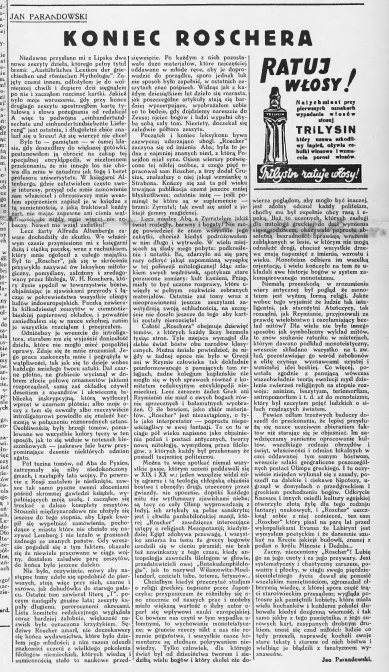
Headline on the front page contains the title of Parandowski’s short story Max von Trott. Wiadomości Literackie, no. 39 (778) 18.09.1938, p. 5. Source: Małopolska Biblioteka Cyfrowa (accessed: January 18, 2021):
